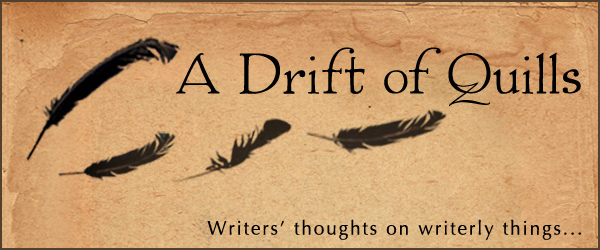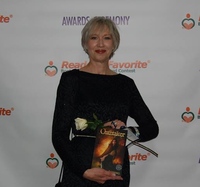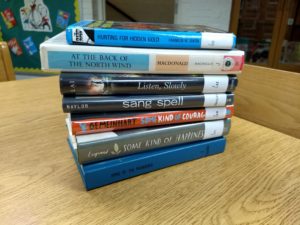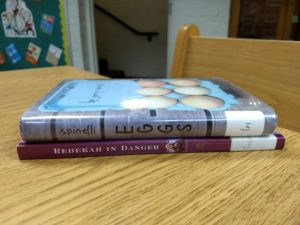
Poets have a vision for what could be. They, perhaps more than any other philosopher, see further and deeper into the unknown. And to read poetry and to grapple with it seriously, to let it wash over you is to push yourself to the very edge of your understanding. And there, perhaps, we may learn something.
Which leads us to book spine poetry, and this month’s topic. What is “book spine poetry”? It’s a fair question, and one that we’ve tried to answer by example. Check out what we’ve found…
 Robin Lythgoe
Robin Lythgoe
Author of As the Crow Flies
My taste in poetry is questionable.
I gravitate toward freeform (usually only my own—how arrogant!), the unusual (sample below), or limericks and “revised” song lyrics (for which I blame my husband).
In my teens I went through an angsty period where I wrote reams of freeform poetry, 98% of which were terrible. Wrist to forehead dramatically, I determined I would make my living as a moody poet. Until I discovered…
 Patricia Reding
Patricia Reding
Author of Oathtaker
These days, as I’m wrapping up my latest work, I’m realizing how much of what I write is intended for—is directed specifically at and to—young women. While I’m certainly old enough, I have no grandchildren of my own. I’m finding, however, that the grandmother in me is coming out anyway. She comes via my life as an author, and my granddaughters include . . .
 Parker Broaddus
Parker Broaddus
Author of A Hero’s Curse & Nightrage Rising
Poetry pushes us to the limit of our understanding – to the edge of ourselves. That’s why it can be so chaotic and disorienting, but it can also be where we learn something new. Something that we couldn’t have known before, had we not been challenged. 
But the challenge of poetry is a soft one. A gentle breeze that carries us beyond, to a new place, and then brings us back, changed. Because when you learn something, you change. You become something new. The old has died.
So poetry is more like dreaming that perhaps any other form of writing. It can be fragmented and juxtapose ideas that we might not have presented together in any other context. It forms connections we might not have made.
In that vein, taking a few moments to form a bit of book spine poetry isn’t just fun – it’s illuminating – at least for me.
Or it can just be entertaining.

What about you? Post your own book spine poetry in the comments below, or on my Facebook page, or tag me on Twitter. I’d love to see what you’ve created or your impressions of others!
Love your poem—it sounds so *you*!
Oh, my goodness, these are great. I especially like the super-duper fast second one!